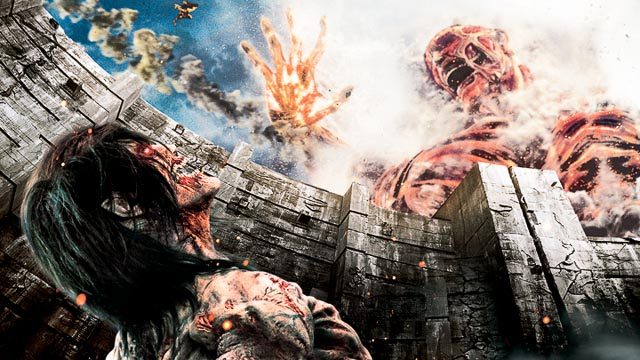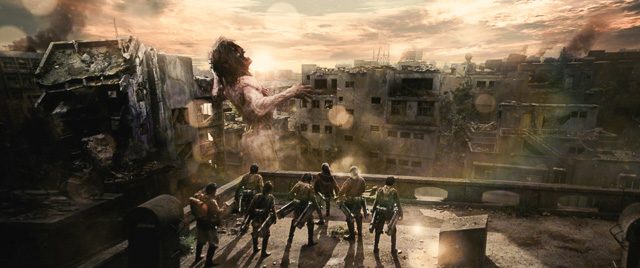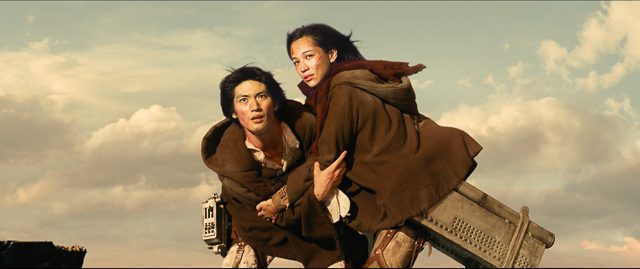SUMMARY
This is AI generated summarization, which may have errors. For context, always refer to the full article.

The second part of Shinji Higuchi’s Attack on Titan adaptation, subtitled End of the World, starts with a summary of what happened in the previous film, which is basically nothing much.
Attack on Titan is really just a showcase of monstrous cataclysm. Whatever plot that frames its gregarious display of destruction and dismemberment is elementary at best. (READ: ‘Attack on Titan’ Review: Grotesque entertainment)
Attack on Titan works because it neglects plot and concentrates on what sets it apart from the rest, which is its being a spectacle of histrionic depravity. Its best moments are when human beings are turned into bloody goo by giants with perpetual smiles on their familiar faces. Its dullest moments are when the film succumbs to the necessity of plot.
***Spoiler warning: If you haven’t seen the previous film and don’t want any spoilers, read no further.***
String of exposition
After the needless recap, a flashback showing a father conducting experiments on his son ensues. The flashback sort of explains how Eren (Haruma Miura), who we last saw transform from a novice fighter into a fearsome Titan who saved most of his ragtag crew of inexperienced teenagers from being food for the chicken-brained giants, got his special power.
The exposition, however does not end there. Afterwards, revelations are piled one after the other. Characters expound, while revealing their true colors. Film clips of life centuries ago are displayed. Higuchi does everything to drive the film back to earth, detailing in such a heavy-handed way how the film’s dystopian world of humanity kept safe by concrete walls relates to the present.
By the time Higuchi’s done filling the film with back stories and epiphanies, everything that made the first Attack on Titan film wildly entertaining despite its obvious deficiencies feels regrettably distant.
End of the World feels more like a sluggish crawl out of hysterical madness back into the boredom of normalcy than the culminating finish of a rabid orgy of delightfully awful graphics and corny melodrama.

Too late
It is quite a common problem for sequels. End of the World suffers because it has nothing to offer to outdo the insanity of the first film. It relies heavily on grounding the fantasy, making it a tad closer to the world we are living in, perhaps to provide a semblance of relevance for its excesses in violence.
Sadly, lectures are far from entertaining, and End of the World is predominantly one about the dangers of humanity’s unpredictable nature which drives men to compromise morality for whatever other purpose. In this case, that includes survival, the maintenance of authoritarian rule within the wall, and freedom.
Higuchi has at least the sensibility to keep the babble zany, with the characters engaging in debates with hilarious earnestness that keeps the film’s affairs from being too severe.
The action scenes come too late. Not only that, they arrive with an underwhelming thud instead of the resounding bang that is to be expected after the first film’s outrageous pageantry of mindless gore and catastrophe.
Higuchi limits the battles to one-on-one brawls between evolved Titans, who lack the grotesque look of the obese, malformed and suspiciously jovial Titans that devour similarly looking humans with cannibalistic glee.

Lucid and tidy
What End of the World does well is to keep everything lucid and tidy.
After the exciting mess that was the first film, End of the World allows itself to be subservient to convenient and conventional storytelling. All the characters have a place. Villains are demolished. Heroes get their just rewards. Sidekicks either perish valiantly or remain steadfast in the sidelines.
End of the World is only disappointing because it directs the series into a territory that made it something that is just more of the same, just a typical adventure set in a fictionalized future that is but a repulsive exaggeration of what is current.
Whatever promise of irreverent morbidity the first film and its visual excesses managed to make has been quickly abandoned for the sake of acceptability. – Rappler.com

Francis Joseph Cruz litigates for a living and writes about cinema for fun. The first Filipino movie he saw in the theaters was Carlo J. Caparas’ ‘Tirad Pass.’ Since then, he’s been on a mission to find better memories with Philippine cinema. Profile photo by Fatcat Studios
Add a comment
How does this make you feel?
There are no comments yet. Add your comment to start the conversation.